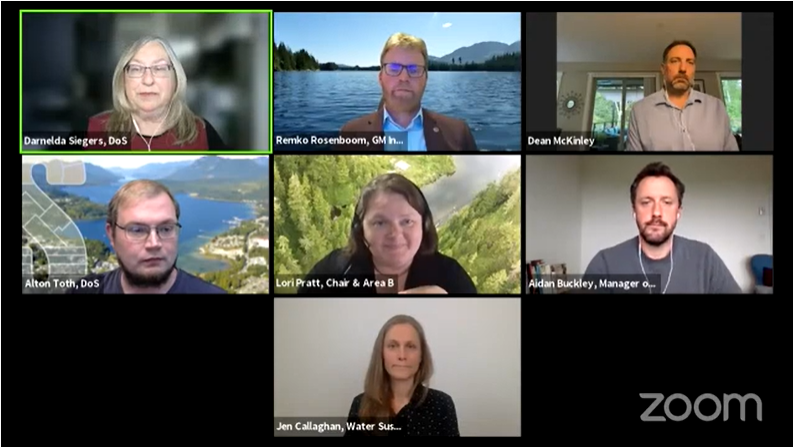If an alternative approval process (AAP) to authorize the $7.25 million loan needed for water meter installation fails, Sunshine Coast Regional District (SCRD) directors are prepared to hold a referendum, Sechelt director Darnelda Siegers said on May 26.
“At the regional district board, we recognize that there are potential people in the community who are opposed to this. We also hear there are a lot of people in favour of water meters,” Siegers said at a virtual Let’s Talk Water event hosted by the SCRD.
“If the AAP is defeated, we have already advised staff that we would like them to go forward with a referendum with the community. That would give all members of the community – those in favour and those opposed – [the ability] to vote and let us know what they want us to do.”
She said an AAP is cheaper than a referendum, which must be set up like an election with poll booths and requires other additional costs. The AAP requires forms to be filled out by those who oppose the loan.
If both the AAP and referendum fail, general manager of infrastructure services Remko Rosenboom said the only option the SCRD would have left would be to increase supply. He reiterated that the SCRD’s target is to not go beyond stage two water restrictions.
This is the second AAP related to water meter installation the SCRD has brought forward, and would see $7.25 million borrowed over a term of 15 years, with an annual cost of around $54 to residents. An AAP to borrow $6 million over 20 years was defeated in 2018.
The loan would cover the third phase of water meter installation on the Sunshine Coast, adding approximately 4,800 meters in the Sechelt area, including the Sechelt Indian Government District. These are the last communities on the Sunshine Coast without water meters in place.
At the Let’s Talk Water presentation, the public also heard rates for water won’t be established until after a rate structure review, which may begin as early as this fall. Part of the review will involve public engagement in 2022 and 2023, and 2024 would be the first year billing would change to reflect the amount of water actually used, Rosenboom said.
“It’s not like we’re going to suddenly flip the switch or turn on the tap and put you onto volumetric pricing,” SCRD board chair and Halfmoon Bay director Lori Pratt said, adding that the SCRD really wants the data water meters would offer. She pointed to how the Town of Gibsons transitioned to water meters and saw a reduction in water usage.
Rosenboom said the SCRD expects the majority of residents would pay less than their current water rate, and a few may pay more.
The presentation centred on conservation as part of the SCRD’s integrated approach to water.
Water sustainability coordinator Jen Callaghan said the daily use of water is typically unknown for residents without water meters, adding that data in utility accounts can help people make informed decisions regarding use. Rosenboom said the regional district and residents can’t conserve water if they don’t know how much they’re using, and that water meters offer the opportunity for fair billing by paying for actual use.
Conserving water could also reduce costs associated with treating water, and increase supply, Rosenboom said. If the water meter installation is completed, the SCRD predicts it could save $10 million by 2030.
Pratt pointed out that without a conservation program including water meters, the SCRD would jeopardize its opportunities to receive provincial and federal funding.
The AAP process began May 21 and will run until July 7, the deadline for elector responses. The results are anticipated to be announced at the July 8 SCRD board meeting.



